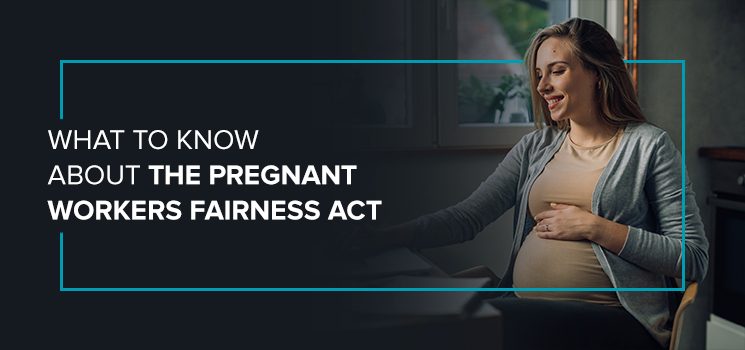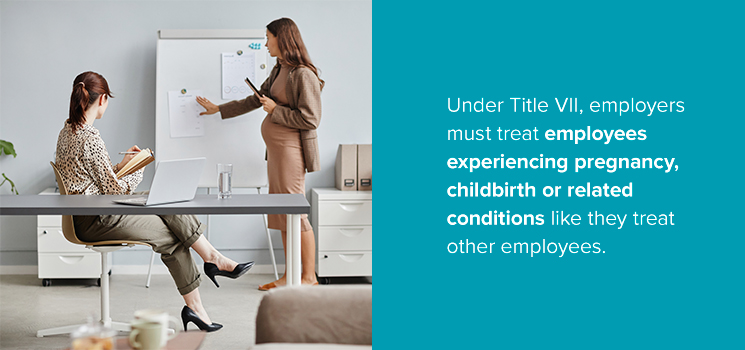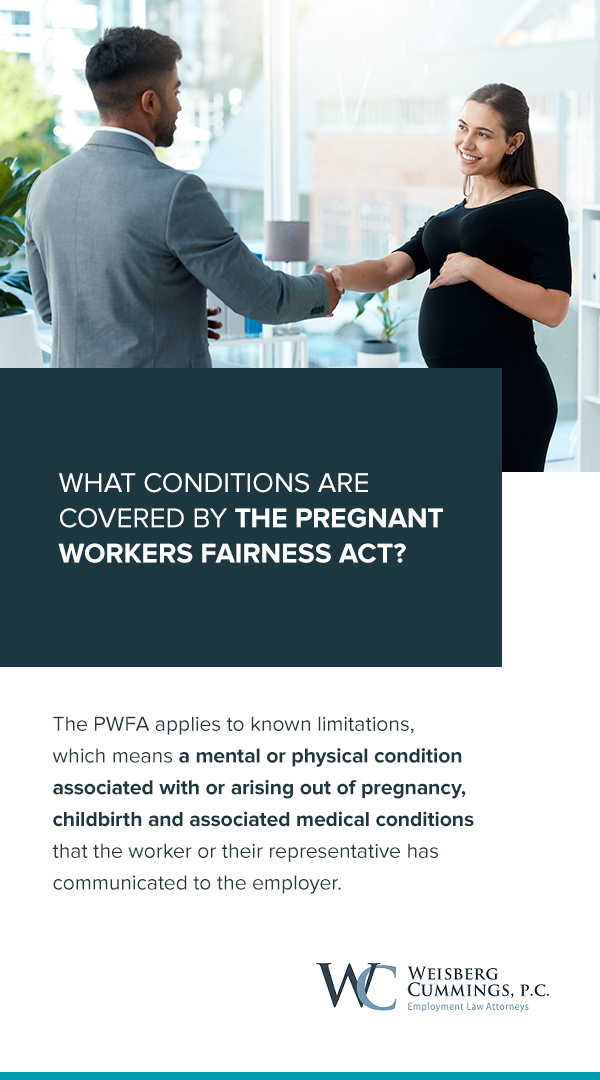By Weisberg Cummings, P.C. on July 18th, 2023
There are various laws that prohibit discrimination against pregnant individuals, but the new pregnancy protection act is unique. For example, unlike the Americans with Disabilities Act (ADA), the Pregnant Workers Fairness Act (PWFA) is not limited to persons with disabilities or related to how employers treat other employees.
The PWFA also helps clarify pregnant employees’ rights in workplaces and details the standards expected from employers. It requires employers to provide the necessary infrastructure and systems to enable eligible workers to perform optimally and safely, which has been needed for years. Employers whose PWFA rights are violated may file a claim or seek legal action in a court of law.
What Is the Pregnant Workers Fairness Act?
The Pregnant Workers Fairness Act is a federal law requiring employers to provide a reasonable accommodation to employees for known limitations related to pregnancy, childbirth and associated conditions. The law generally applies to employers with 15 or more employees, unless those who would incur undue hardship should they make reasonable accommodation for pregnant workers.
Besides mandating employers to make reasonable accommodations, the PWFA prohibits situations where employers:
- Deny covered employees employment opportunities because of the need to make reasonable accommodations.
- Require covered workers to accept anything other than a reasonable accommodation determined through an interactive process.
- Require covered workers to take paid or unpaid leave if the employer can provide an alternative reasonable accommodation.
- Take adverse actions against covered employees regarding their terms, conditions and privileges of employment for requesting reasonable accommodation.
- Retaliate against workers for complaining, reporting or opposing unlawful discrimination under the PWFA.
- Interfere with a covered employee’s rights under the PWFA.
What Is the Background of the Pregnant Workers Fairness Act?
The rights of pregnant persons, especially in workplaces, have evolved over the years. In 1908, the United States Supreme Court approved an Oregon law limiting women’s shifts to 10 hours in certain physically demanding jobs. By the time Congress enacted Title VII of the 1964 Civil Right Act, many states had implemented laws preventing women from working on the same terms as men. Title VII seeks to nullify these laws, yet some employers continued to single out pregnant workers.
Congress passed the Pregnancy Discrimination Act (PDA) in 1978 to expand the meaning of sex to include pregnancy, childbirth and related conditions and mandated employers to offer benefits to pregnant persons the same way it did for the other employees. There were positives. However, some courts interpreted the PDA narrowly, allowing employers to refuse to accommodate workers with medical needs arising from pregnancy. Even when the Americans with Disability Act was enacted in 1990, some employers denied accommodation for pregnant persons on the basis they were dissimilar to those protected by the law.
In 2015, the Supreme Court held that employers could only deny pregnant employees accommodation if they had sufficiently strong reasons. The decision made tremendous progress, yet PDA violations persisted. The PWFA was designed to clarify ambiguities and inconsistencies and establish easy-to-apply legal standards for accommodating pregnant individuals at workplaces.
Do Other Laws Prohibit Workplace Discrimination Against Pregnant Employees?
Several laws prohibit workplace discrimination against pregnant employees, including the following:
1. Title VII of the Civil Rights Act of 1964
Title VII of the Civil Rights Act prohibits employment discrimination based on color, race, religion, national origin or sex, including pregnancy, childbirth and related medical conditions. The law also prohibits taking any action that negatively impacts or retaliates against an employee who exercises their rights under the law. For example, an employer breaches the law if they sanction an employee for:
- Complaining about discriminatory conduct related to pregnancy, childbirth or related medical conditions.
- Filing a complaint with an agency such as the Equal Employment Opportunity Commission (EEOC).
- Testifying or providing information in an employment discrimination investigation or lawsuit.
Under Title VII, employers must treat employees experiencing pregnancy, childbirth or related conditions like they treat other employees. However, the employer may be required to do more to accommodate such employees in certain instances. A classic example is reasonably adjusting workplace policies and practices to accommodate pregnant and postpartum mothers.
2. The Americans With Disabilities Act of 1990
The Americans with Disabilities Act is a civil rights law prohibiting discrimination against persons with disabilities in all areas of life, including jobs, schools and public places. The law seeks to provide such persons with the same protections, rights and opportunities as every other person.
Although pregnancy does not qualify as a disability under the ADA, certain pregnancy-related conditions may be substantially limiting within the meaning of the law. For example, pelvic inflammation can substantially limit a person’s walking ability. Pregnancy-related carpal tunnel syndrome may also affect a person’s ability to lift or perform manual tasks. Other impairments that may substantially limit other primary bodily functions include gestational diabetes, sciatica and preeclampsia.
Pregnancy-related conditions that entitle a person to the right under the ADA are determined on a case-by-case basis. Once an employee qualifies, the employer must provide “reasonable accommodation,” including making facilities readily available and useable. The ADA is enforced by the EEOC.
3. The Family and Medical Leave Act of 1993
The Family and Medical Leave Act (FMLA) entitles qualified workers of employers covered by the Act to take job-protected and unpaid leave for defined medical and family reasons with the continuance of group health insurance coverage under the same terms and conditions as if the employee had not taken leave. A qualifying reason for taking FMLA leave may include conditions relating to pregnancy and childbirth.
The law allows eligible employees to use 12 workweeks of leave within 12 months for prenatal care, the birth of a child or an incapacity related to pregnancy. When a mother experiences severe health conditions after childbirth, they can also use the leave to seek medical attention. A father of the child may also use the FMLA leave to care for the mother and child during the birth of the child or when the spouse is incapacitated due to pregnancy. The FMLA is enforced by the Department of Labor (DOL).
4. The Providing Urgent Maternal Protections for Nursing Mothers Act
The Providing Urgent Maternal Protections for Nursing Mothers Act (PUMP) Act is a federal legislation that extends workplace lactation protection for breastfeeding employees. The PUMP Act builds on the Fair Labor Standards Act (FLSA) and makes several changes to the Break Time for Nursing Mothers Law, which was signed as part of the Affordable Care Act of 2010.
Before the PUMP Act was enacted, certain categories of employees were left unprotected. About nine million workers, including teachers and nurses, could not receive pumping breaks in private spaces during work hours. The Act seeks to close this gap by mandating employers with over 50 employees to provide a private and suitable space for lactating mothers to express milk at the workplace. Employees may use a reasonable daily break to pump milk and continue until one year after the child’s birth.
Is the Pregnant Workers Fairness Act Passed?
Yes, the PWFA was signed into law on December 29, 2022. The effective date was June 27, 2023.
Who Is a Qualified Employee Under the Pregnancy Protection Act?
A qualified employee under the PWFA is a worker or an applicant who can perform the essential job functions, with or without reasonable accommodation. However, an applicant or employee also qualifies if:
- The inability to execute as required is only temporary.
- The essential job functions can be executed in the near future.
- The inability to perform the job roles can be reasonably accommodated.
What Conditions Are Covered by the Pregnant Workers Fairness Act?
The PWFA applies to known limitations, which means a mental or physical condition associated with or arising out of pregnancy, childbirth and associated medical conditions that the worker or their representative has communicated to the employer. Known limitations under the law are not tied to the definition of a “disability” under the ADA, giving it a much broader scope.
What Qualifies as Reasonable Accommodation Under the PWFA?
The “reasonable accommodation” definition under the PWFA is the same as that defined under the ADA. It means any change, adjustment or modification to job performance or the usual operations at the workplace that provides an employee with a disability an equal opportunity to execute a task successfully. A reasonable accommodation is typically determined by an “interactive process” between the employer and a covered employee.
The Act directs the EEOC to issue regulations that, among other things, provide further information regarding reasonable accommodation. Examples may include the following:
- Access to closer parking
- Flexible working hours
- Remote working
- Ability to drink
- Ability to sit
- Providing safety apparel and appropriately sized uniforms
- Making extra break time allowances for bathroom use
- Excusal from strenuous activities or those that expose the individual to conditions unsafe for pregnancy
- Using leave to recover from childbirth
- Assisting with manual labor
What Is Undue Hardship Under the PWFA?
Undue hardship is a change or modification that would cost the employer significant amounts of money or cause challenges to the employer. It is determined based on factors such as:
- The cost and nature of the accommodation
- The type of operations
- The overall fiscal resources available to the facility and the impact of such accommodation on the facility’s operations
- The overall fiscal resources available to the entity, including the type, number and location of its facilities
What may be considered undue hardships depends on the facts of each case. However, the employer must engage in an “interactive process” with the employee before responding to the worker’s request.
What Is an Interactive Process?
An interactive process is a good-faith conversation between the employer and an employee seeking reasonable accommodation to enable the employee to perform their job. The engagement may occur in person, via email, phone, video conferencing or any other communication channel. The employer should promptly respond to the employee’s request and work with them to develop an appropriate work system. The employer may either provide what the employee requested or an alternative yet effective solution that meets the employee’s needs.
When an employee requests a reasonable accommodation and the employer identifies the need, the employer may:
- Assess the employee’s role to identify the essential functions.
- Consult with the employee to ascertain the specific job-related limitation arising from the pregnancy and how those limitations could be resolved with reasonable accommodation.
- Determine potential accommodations in consultation with the employee and evaluate how each could benefit the employee.
- Consider the employee’s preference and implement the appropriate accommodation for both parties.
Is the PWFA a Law Against Firing Pregnant Women?
The PWFA protects the employee against several discriminatory and unfavorable situations, including unlawful termination of employment, denial of benefits and refusal to offer certain positions to the pregnant individual. It provides more protection besides job security.
Who Enforces the Pregnant Workers Fairness Act?
The EEOC is responsible for implementing and enforcing the PWFA.
Has the EEOC Started Accepting Charges Under the PWFA in PA?
Yes, the EEOC issued a press release on June 27, 2023, that it had started accepting charges under the PWFA across the country, including Pennsylvania. A person affected may file a complaint online, call the agency or visit the EEOC office within their jurisdiction. It’s essential to gather all relevant documents before filing with the EEOC, including the request and response for reasonable accommodation and other necessary email correspondence. The EEOC may also ask for your personal and contact information and details about your employer.
After hearing your complaint, the EEOC may contact your employer to investigate the situation and decide. If the agency cannot substantiate your claim, they may issue a “right to sue” letter. On the other hand, if the agency determines a violation, it may work with the employer and employee to resolve the challenge. Where a resolution is not reached during the mediation process, the EEOC may bring a lawsuit against your employer or issue a “right to sue” letter.
Can You Sue Your Employer for Breaching the PWFA in PA?
Yes, you may sue your employer for breaching the PWFA in PA. You may wait 180 days after filing a complaint with the EEOC and obtain a “right to sue” letter from the EEOC, which allows you to file a lawsuit in court. The court may compel the employer to provide reasonable accommodation. You may also seek other reliefs, including damages for the breach, lost wages and attorney fees.
Do You Need an Attorney to Enforce Your PWFA Rights in PA?
While partnering with an attorney is not mandatory, they can offer tremendous assistance. It’s best to put your best foot forward, whether filing a complaint with the EEOC or instituting legal action against your employer. Lawyers have the experience to present the best evidence and argue their case to help achieve a favorable outcome.
Contact an Employment Attorney at Weisberg Cummings
The PWFA strengthens the rights of pregnant persons at workplaces, providing clear standards and guidelines. It requires covered employers to make reasonable accommodations for qualified employees unless it will cause undue hardship. Employees whose rights are violated may file a complaint with the EEOC or institute legal action against their employers.
Weisberg Cummings offers efficient and individualized legal solutions to workers in PA. We represent and advise clients on employment-related matters, including gender and pregnancy discrimination. Do you want to learn more about your rights under the PWFA or need legal assistance? Contact us now!





